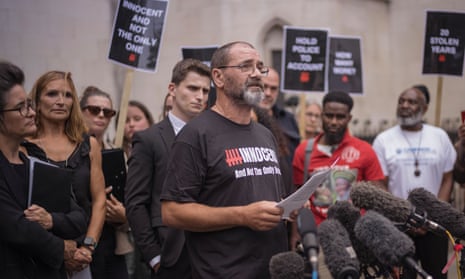A man who spent 17 years in prison for rape has had his conviction overturned by the court of appeal.
Andrew Malkinson was convicted in 2004 of raping a 33-year-old woman who was left for dead on a motorway embankment in Salford, Greater Manchester.
After enduring two decades of being labelled a sex offender, Malkinson, 57, had his conviction quashed on Wednesday after a DNA breakthrough.
Justice Holroyde, vice-president of the appeal court, said the appeal was allowed on the basis of the DNA evidence and reserved judgment on whether it would be allowed on other issues, including police disclosure.
There was never any DNA linking Malkinson to the crime and he always insisted he was innocent, spending more than double the time in prison as a result.
His case was referred to the court of appeal in January after another man’s DNA was found on fragments of the victim’s clothing.
Reading a statement to journalists outside the Royal Courts of Justice, Malkinson said: “I came to the police station in 2003 and told the officers I was innocent. They didn’t believe me.
“I came to the crown court in Manchester in 2004 and told the jury I was innocent. They didn’t believe me. I came to this appeal court in 2006 and told them I was innocent. They didn’t believe me.
“I applied to the Criminal Cases Review Commission, which is supposed to investigate miscarriages of justice, and told them I was innocent. They didn’t investigate and they didn’t believe me. Not once, but twice.
“Today we told this court I was innocent and, finally, they listened. But I have been innocent all along, for each of those 20 years that came before today. Nothing any police officer, court or commission said about me since 2003 changed that reality.”
Greater Manchester police apologised to Malkinson after the judge’s decision, saying he had been a victim of a “a grave miscarriage of justice”.
Sarah Jackson, an assistant chief constable, said: “Whilst we hope this outcome gives him a long-overdue sense of justice, we acknowledge that it does not return the years he has lost. I have offered to meet with him to personally deliver this apology.
“We are also profoundly sorry to the victim of this crime, who not only suffered an horrific trauma 20 years ago, but also relived the experience during a criminal trial, and now may endure additional harm caused by learning that the true offender has not yet been brought to justice. We are absolutely committed to following all new lines of inquiry to ensure the right person is held accountable for harming her.”
Malkinson was unmoved by the apology. “That’s not a real apology, at all,” he said. “That’s a PR exercise.”
The court of appeal heard that Malkinson had been denied a fair trial because of “grave and repeated” failings of disclosure by the force.
At his original trial, the court was not told that a key witness was a “long-term heroin addict” with multiple criminal convictions – or that he came forward as a witness only on the night that he was arrested for another crime. The disclosure failure came despite explicit requests for witnesses’ criminal records.
Michael Seward had claimed to be driving in the middle of the night with a woman who was also a witness in the case and whose criminal convictions were also not disclosed to the court. They both said they had been witnesses to the moments leading up to the rape.
Seward, who has since died, was arrested on the date he came forward as a witness and on the date he identified Malkinson in a video lineup six months later. Malkinson’s lawyers say Seward received arguably lenient penalties in relation to the criminal charges he faced, raising questions over his motivation.
GMP also failed to disclose a photograph that supported the victim’s memory of causing such a “deep scratch” to her attacker’s cheek that she broke a nail. Malkinson was seen by police the next day with no marks on his face, and at his trial, the judge invited the jury to consider that the victim might have been mistaken in her memory of the scratch.
But it now emerges that the court was not given photographs taken on the night of the attack, which showed one nail on her left hand significantly shorter than the others.
The failures of disclosure were identified only 15 years after Malkinson’s conviction, when his case was taken on by the legal charity Appeal.
The DNA breakthrough in the case was also nearly rendered impossible because of the destruction of key exhibits by GMP.
The victim’s vest top, bra, knickers and other clothing were destroyed by GMP, while a preservation order was still in place. Retesting was possible only because small samples from her clothes were found in a national archive by Malkinson’s representatives at appeal.
Jackson insisted that such cases were “thankfully very rare”. “The force has and will continue to fully cooperate with any further reviews of this case, and action will be taken if it is found that anything could have been done differently,” she said.
“Due to new forensic evidence, following developments in forensic technologies, there is a live criminal investigation in which a suspect remains on bail. We cannot comment further on that matter at this time.”
Helen Pitcher OBE, chair of the Criminal Cases Review Commission, said: “We recognise that Andrew has had a very long journey to clear his name, but sadly the evidence that led to the court overturning his conviction only became available years after his conviction.”
